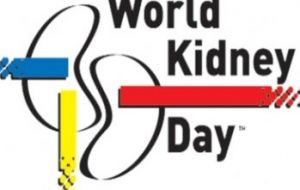MercoPress. South Atlantic News Agency
Chronic kidney disease affects an estimated one in ten adults, says PAHO/WHO
 World Kidney Day is celebrated on 13 March
World Kidney Day is celebrated on 13 March Diabetes and high blood pressure, together with aging, are the main risk factors for developing chronic kidney disease, which affects an estimated one in 10 adults globally, according to studies.
The Pan American Health Organization/World Health Organization (PAHO/WHO) is calling on healthcare providers to test high-risk patients for signs of kidney disease, particularly those with diabetes and hypertension, and is calling on individuals to maintain healthy lifestyles.
Chronic kidney disease and aging is the theme of this year’s World Kidney Day, celebrated on March 13 and promoted by the International Society of Nephrology and the International Federation of Kidney Foundations.
Chronic kidney disease (CKD) is the progressive loss of kidney function over months or years. In its early stages, the disease produces no symptoms and is treatable. But in more advanced stages, patients can require dialysis and even kidney transplants.
In the last half-century, life expectancy in Latin America and the Caribbean has increased more than 20 years. “People are living longer, including those with one or more chronic diseases and risk factors. This allows the effects on organs such as the kidney to accumulate in older people, so we need to pay more attention to the problem,” said Enrique Vega, PAHO/WHO regional advisor on aging and health.
In the United States, the National Health and Nutrition Examination Survey (NHANES) found that new cases of CKD doubled in people over 65 between 2000 and 2008. Prevalence of CKD in people over 60 rose from 18.8% in 2003 to 24.5% in 2006, although it remained below 0.5% among people ages 20 to 39.
“Being physical active, not smoking, having a healthy diet that’s low in salt and sugar, and getting your blood pressure checked regularly can prevent hypertension and type 2 diabetes. And if one has diabetes or hypertension, keeping those under control can prevent them from damaging the kidneys,” said Pedro Orduñez, PAHO/WHO advisor on prevention and control of non-communicable diseases.
In Latin America and the Caribbean, one in three older adults suffers from one of the six most common age-related chronic diseases: hypertension, diabetes, heart disease, cerebro-vascular disease, arthropathy (joint disease), or chronic lung disease. Two-thirds of seniors have at least two of the top three risk factors for chronic disease, smoking, overweight, and physical inactivity, according to the PAHO/WHO Survey on Health, Well-being and Elders (SABE).
To detect CKD, experts recommend blood and urine tests, and blood pressure checks, especially in high-risk groups including people with diabetes or hypertension, those over 65, people who have suffered a heart attack, those with relatives who have had kidney disease, smokers, and sedentary people.
Simple, low-cost treatments are available that can slow the progress of kidney disease and reduce the risks of heart attack and stroke, while improving quality of life.
In the Americas, three out of four deaths—more than 4.45 million each year—are caused by non-communicable diseases such as cancer, diabetes, cardiovascular disease, and chronic respiratory disease. PAHO/WHO is working with its member countries to reduce premature deaths from these diseases by 25% by 2025.




Top Comments
Disclaimer & comment rulesCommenting for this story is now closed.
If you have a Facebook account, become a fan and comment on our Facebook Page!